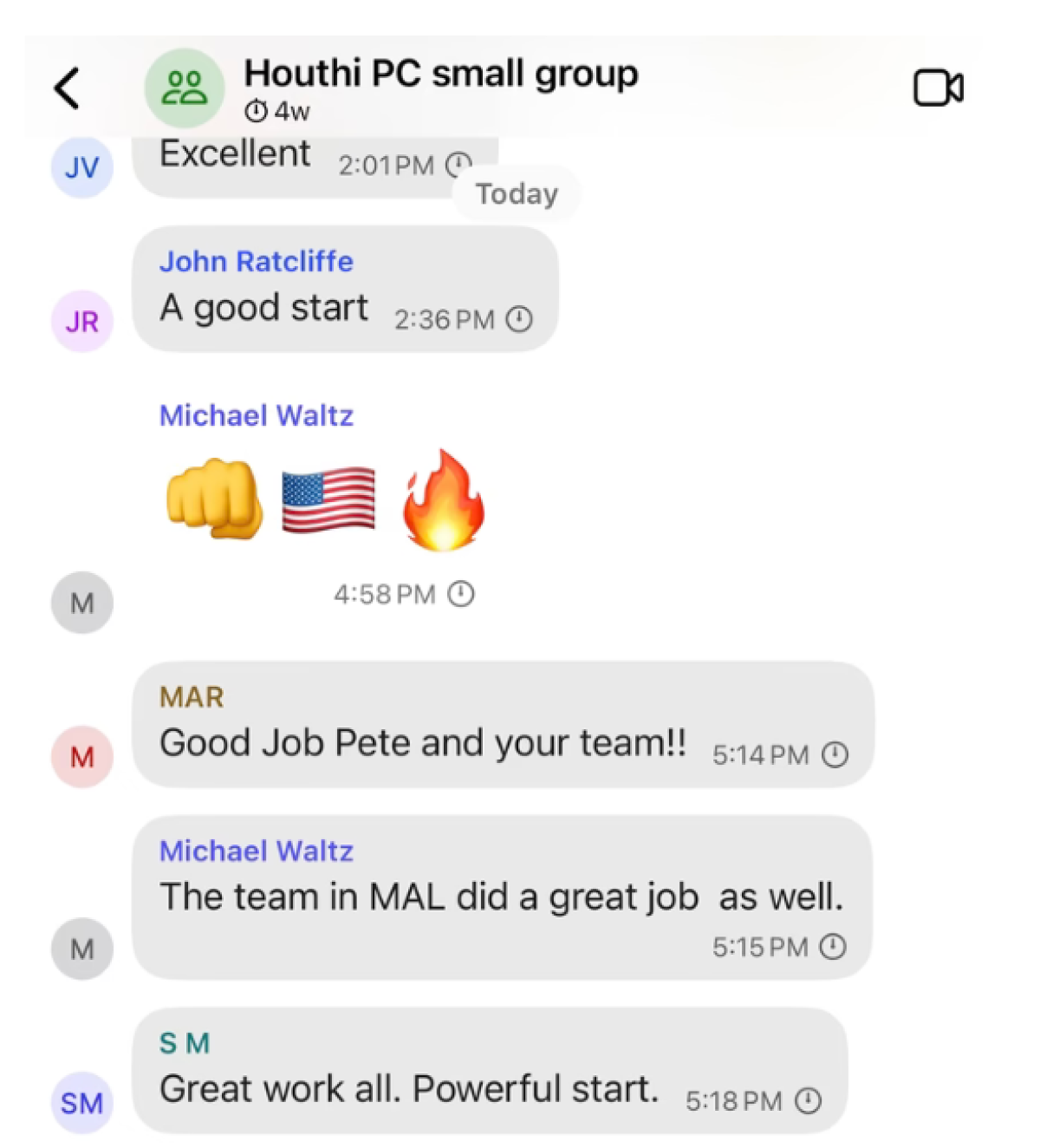On March 11, 2025, a group of senior U.S. national security officials shared a confidential discussion on the messaging platform Signal, The Atlantic Editor-in-Chief, Jeffery Goldberg was mistakenly added to the group chat. The conversation focused on upcoming United States military actions against Houthi forces in Yemen, showing how serious and specific the situation and the officials’ decisions really were.
Who was in the Signal Chat?
The group included key figures from the White House, the State Department, and the Department of Defense. Among the participants in Signal were:
Who was in the group chat:
- JD Vance, Vice President
- Alex Wong, Principal Deputy National Security Adviser
- Brian McCormack, Chief of Staff for the Secretary of the Treasury
- Dan Katz, Chief of Staff for the Secretary of Treasury
- Jacob, identity unknown
- Jeffery Goldberg, Editor-in-Chief of The Atlantic
- Joe Kent, Acting Chief of Staff for the director of National Intelligence and nominee for National Counterterrorism Center Director
- John Ratcliffe, Director of the Central Intelligence Agency
- Marco Rubio, Secretary of State
- Mike Needhame, Special Adviser and consultant on Foreign Policy Issues for the Department of State
- Mike Waltz, National Security Advisor
- Pete Hegseth, Secretary of Defense
- Scott Bessent, Secretary of Treasury
- Stephen Miller, White House Deputy Chief of Staff for Policy
- Steve Witkoff, United States Special Envoy to Middle East
- Susie Wiles, White House Chief of Staff
- Tulsi Gabbard, Director of National Intelligence
- Walker Barret, Professional Staff Member for the House Armed Services Committee Republicans
Additionally, an unnamed CIA officer participated in the discussion, though The Atlantic withheld their identity at the agency’s request.

Trump Team’s Defense: A “Team Update”
When questioned about the chat, Trump and his team denied that any classified information was shared. They claimed it was simply a “team update” that did not mention intelligence-collection sources or methods. However, this explanation raises concerns, especially since the conversation involved The Atlantic’s editor-in-chief and came to reveal real military operations.
Despite the scandal, no one in Trump’s National Security team was fired. The lack of accountability raised serious concerns about the security and oversight of sensitive government operations.
What the Classification Guidelines Say
The U.S. Department of Defense has clear rules stating that detailed military plans like those shared in the Signal chat, are typically classified at the “Secret” level or higher. Classified information includes:
- Date and time mission beings
- Timelines and schedules
- Locations, resources, tactics, and deployments
- Execution plans and operational maneuvers
What Was Shared in the Chat:
Defense Secretary Pete Hegseth shared the exact timing of plans to strike Houthi targets including:
- When F-18 fighter jets would launch
- When the first bombs were expected to drop
- The timing of naval Tomahawk missile launches
He sent these details before the operation had taken place and claimed the message was “clean on OPSEC.” However, that phrase suggests he knew the information was sensitive, raising the question: was it really not classified?

National Security Advisor Mike Waltz added to the controversy by sharing a live update:
- “First target – their top missile guy. We had a positive ID of him walking into his girlfriend’s building and it’s now collapsed”
This message could reveal U.S. intelligence capabilities and assets in the region, which would typically be protected under classification rules.
Casualties and Airstrikes in Yemen
Between March 15 and March 21, the Armed Conflict Location & Event Date Project recorded 56 separate airstrikes in Yemen. The UK-based group Airwards reported that at least five of these strikes may have caused civilian deaths, based on video evidence, Houthi statements, and other sources. According to Houthi figures, 57 people have been killed so far.
Will There Be Legal Consequences?
Despite the potential national security violations, officials involved don’t appear to be at risk of criminal charges under the Espionage Act. This law makes it illegal to improperly share “national defense information,” even if it’s not officially marked classified. One reason for the lack of legal action may be that the Trump Justice Department is unlikely to prosecute its own cabinet members, even if sensitive information was shared.
Legal Fallout: A Double Standard?
The administration’s tough stance in the deportation case under the Alien Enemies Act could come back to hurt them. In the new lawsuit over the Signal chat, Judge Boasberg may question the shifting explanations of what was and wasn’t classified; casting doubt on the administration’s defense and making the case more difficult to win.





















